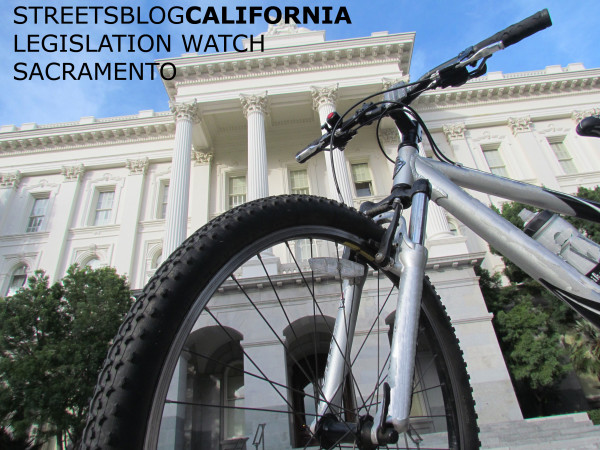Governor Newsom, saying the bill is "unnecessary," vetoed A.B. 2438 yesterday. The bill would have required transportation funding programs, including highway funding programs, to incorporate strategies from the state's Climate Action Plan for Transportation Infrastructure (CAPTI).
"Work is well under way at the California State Transportation Agency (CalSTA), the California Department of Transportation (Caltrans) and the California Transportation Commission to align funding programs in the bill with CAPTI, with several actions already completed," wrote Newsom in his veto statement.
While that work is indeed underway, it doesn't necessarily follow that making it a statutory requirement is unnecessary. For one example, look at how long it took Caltrans to see the importance of complete streets in its work. Caltrans is working to incorporate complete streets strategies into its policies and planning now, but just getting to this beginning stage that took years of work and multiple iterations of executive-level policy directives - which were ignored at first - as well as strong leadership. And those efforts could quickly fizzle out if a new governor or a new head of Caltrans lost interest in them.
Putting the requirement to align funding programs with existing state climate policy into statute would only strengthen the state's commitment to fighting climate change.
“We are deeply disappointed that A.B. 2438 was not signed into law," wrote ClimatePlan in a statement. "We saw A.B. 2438 as an opportunity to solidify all the work the administration has been doing on climate issues. This bill would have aligned transportation investments with our climate goals. We see this as a necessary step towards reducing emissions, cleaning our air, and investing in our future."
The bill, the advocates pointed out, was one attempt to address findings from the A.B. 285 report that showed that only a tiny percentage of California’s annual billion-dollar transportation budget aligns with the state’s climate goals.
"With the influx of federal dollars coming in from the Infrastructure Investment and Jobs Act (IIJA) and the Inflation Reduction Act (IRA), California must align its transportation dollars with our climate goals. Our tax dollars cannot be continuously spent on polluting and inequitable transportation infrastructure projects that will undermine our state’s climate, health, and equity goals," ClimatePlan wrote.
Of deep concern is something else in Newsom's veto statement. He writes:
CalSTA is committed to reviewing outcomes and integrating public feedback in future years to make modifications to CAPTI, as necessary, to meet the needs of the statewide transportation system. Linking these programs in statute to a specific iteration of this plan inhibits the state's ability to appropriately respond to the evolution of the state's response to climate change.
A.B. 2438 did not focus on linking to any "specific iteration" of CAPTI, but to CAPTI itself, which would presumably mean including any new information or changes. The document has been described as a "living document" for exactly that reason - so that needed changes can be incorporated as more information becomes available and new technologies are deployed.
But more worrying than that: CAPTI has received a lot of pushback on its strategies, especially where they provide clear policy direction asserting that continuing to build highways will not help California meet its climate goals. Newsom writes that future public feedback will modify CAPTI "to meet the needs of the statewide transportation system."
Does this mean the highway lobby has plans to weaken CAPTI?
That is more of an argument for signing the bill, Governor Newsom, than for vetoing it.






